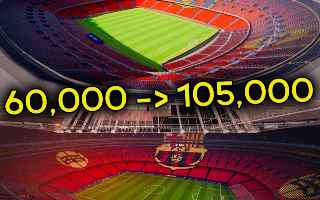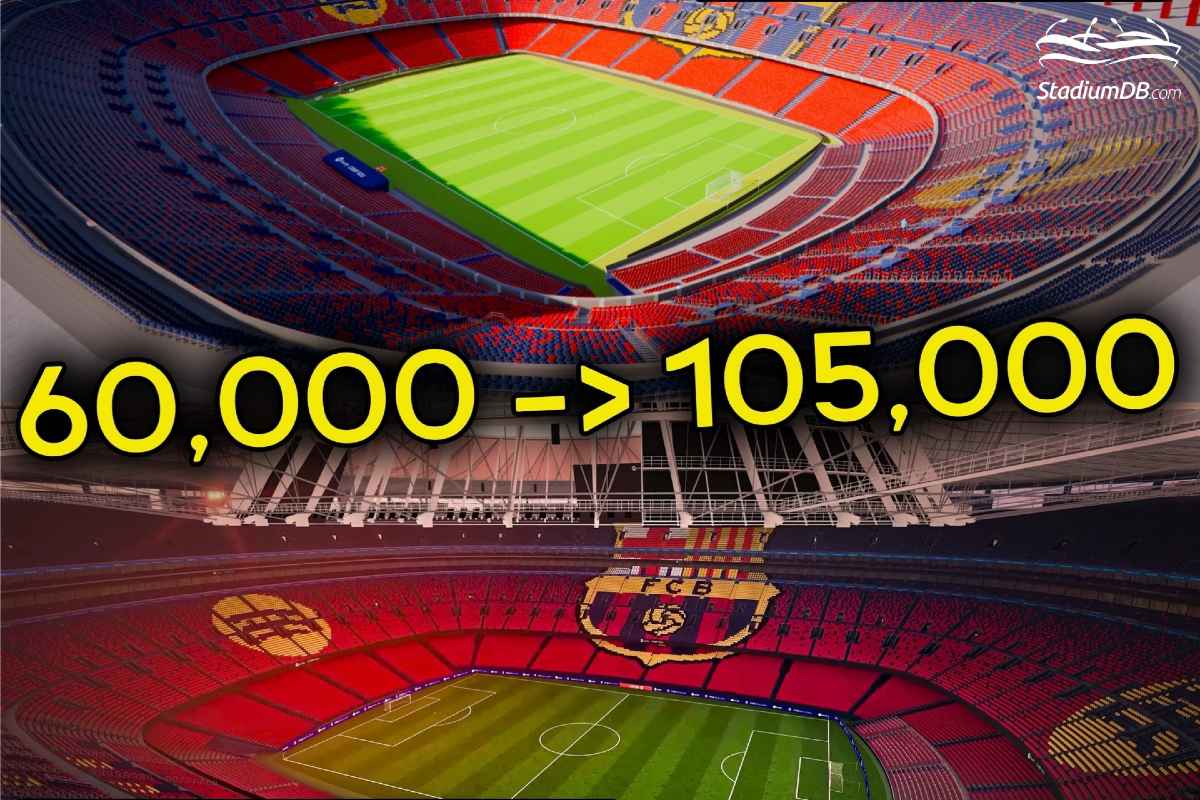Spain: May’s El Clasico – the first match at Camp Nou!
source: StadiumDB.com; author: Paulina Skóra, Kuba Kowalski
 FC Barcelona is racing against time to return to Camp Nou in May. The pitch, city negotiations, and a Plan B – what obstacles lie ahead? Find out what challenges await the club in the coming months.
FC Barcelona is racing against time to return to Camp Nou in May. The pitch, city negotiations, and a Plan B – what obstacles lie ahead? Find out what challenges await the club in the coming months.
Advertisement
Nervous three months ahead for FC Barcelona
The return to Camp Nou is expected by the end of April, provided no new unforeseen circumstances
arise, Joan Laporta reminded during a recent press conference.
On Friday, FC Barcelona informed its season ticket holders of an extension of their use of Estadi Olímpic Lluís Companys until April 23, coinciding with the match against Mallorca. This confirms the information published by Mundo Deportivo last Monday, stating that the club had requested Barcelona Municipal Services (BSM), the operator of the Estadi Olímpic, to extend the rental until April, with plans to return to Spotify Camp Nou in May.
In the message sent to ticket holders, FC Barcelona announced the extension of the 2024/25 season ticket for Estadi Olímpic Lluís Companys until April 23, 2025, the date of the match against Mallorca as part of the 33rd La Liga matchday.
The club also clarified that the extension includes all La Liga, UEFA Champions League, and Copa del Rey matches played at home by the men’s first team until that date.
The pitch Is key
FC Barcelona has asked Limak for maximum effort, prioritizing all aspects of logistics to enable the stadium's opening within three months. Currently, aside from access and safety concerns, the greatest challenge is the pitch installation. The company Garden Tona has not yet been able to start work, as the field remains filled with debris, and subcontractors are focused on other tasks. Once the site is cleared and leveled, it will take about two months before a match can be played on the new turf.
We are building a new stadium; this is not a renovation. We will return as soon as possible,
said Laporta. Work outside the stadium is progressing quickly, but inside, preparations are still underway. The VIP area, whose construction was supposed to start in November, remains on hold.
What if the club fails to reach an agreement on Montjuïc?
Returning to Camp Nou this season is crucial for the club’s finances. Joan Laporta emphasized that Spotify Camp Nou will be the primary source of revenue in the coming years. This year’s budget projected €28 million in revenue from matches at the new stadium. While achieving this goal is now impossible, the club can reduce losses by hosting two or three games.
The delayed return to Camp Nou also presents another issue. To continue playing at Montjuïc, the club must reach an agreement with city authorities. In spring and summer, the stadium is scheduled to host concerts, meaning an extension of its use may not be feasible. At best, the club would need to compensate concert organizers for rescheduling their events. Barcelona has been preparing a plan B for weeks, seeking an alternative temporary stadium in case negotiations to extend Montjuïc's use fail.
 Once the 60,000 seats are completed, work will begin to expand Camp Nou’s capacity to a record-breaking 105,000.
Once the 60,000 seats are completed, work will begin to expand Camp Nou’s capacity to a record-breaking 105,000.
According to reports by Sport, the club also has a plan C: returning to Camp Nou without fans. While this seems like a simple solution, it is far from straightforward. Playing matches in a closed stadium would require a municipal license. The permits and licenses we issue for opening a facility, even without public attendance, must meet certain requirements,
warned David Escudé, Barcelona’s councilor for sports, in an interview with EFE.
VIP boxes go on sale
Barcelona has announced the sale of 475 VIP seats, representing 5.5% of the future Camp Nou, which will have more than 9,000 premium seats. The transaction was made with two investors from the Middle East: one company from Qatar and another from Dubai. According to the club's official statement, the investors secured management rights for these seats for 30 years. These spaces can be used personally or for commercial purposes. The club mitigates risks related to VIP seat commercialization by ensuring steady income throughout the 30-year period. Investors pay an upfront fee for the seat licenses and annual fees for the VIP spaces. Through this deal, Barça will collect approximately €100 million.
Advertisement
 StadiumDB
StadiumDB